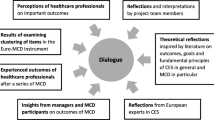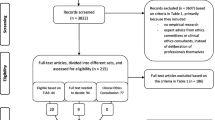Abstract
Health care professionals often face moral dilemmas. Not dealing constructively with moral dilemmas can cause moral distress and can negatively affect the quality of care. Little research has been documented with methodologies meant to support professionals in care for the homeless in dealing with their dilemmas. Moral case deliberation (MCD) is a method for systematic reflection on moral dilemmas and is increasingly being used as ethics support for professionals in various health-care domains. This study deals with the question: What is the contribution of MCD in helping professionals in an institution for care for the homeless to deal with their moral dilemmas? A mixed-methods responsive evaluation design was used to answer the research question. Five teams of professionals from a Dutch care institution for the homeless participated in MCD three times. Professionals in care for the homeless value MCD positively. They report that MCD helped them to identify the moral dilemma/question, and that they learned from other people’s perspectives while reflecting and deliberating on the values at stake in the dilemma or moral question. They became aware of the moral dimension of moral dilemmas, of related norms and values, of other perspectives, and learned to formulate a moral standpoint. Some experienced the influence of MCD in the way they dealt with moral dilemmas in daily practice. Half of the professionals expect MCD will influence the way they deal with moral dilemmas in the future. Most of them were in favour of further implementation of MCD in their organization.

Similar content being viewed by others
References
Abma, T., Molewijk, B., & Widdershoven, G. A. M. (2009). Good care in ongoing dialogue. Improving the quality of care through moral deliberation and responsive evaluation. Health Care Analysis, 17(3), 217–235.
Aristotle. (2008). Ethica Nicomachea. Translated by Hupperts, C. and Poortman, B. Budel: Uitgeverij Damon.
Banks, S. (2011). Ethics in an age of austerity: Social work and the evolving new public management. Journal of Social Intervention, 20(2), 5–23.
Banks, S., & Williams, R. (2004). Accounting for ethical difficulties in social welfare work: Issues, problems and dilemmas. British Journal of Social Work, 35(7), 1005–1022.
Dauwerse, L., Abma, T., Molewijk, B., & Widdershoven, G. (2013). Goals of clinical ethics support. Perceptions of Dutch Health Care Institutions. Health Care Analysis, 21(4), 323–337.
Fisk, D., Rakfeldt, J., Heffernan, K., & Rowe, M. (1999). Outreach workers’ experiences in a homeless outreach project; issues of boundaries, ethics and staff safety. Psychiatric Quarterly, 70(3), 231–247.
Gadamer, H.-G. (2010). Wahrheit und Methode (7. Aufl.) [Truth and Method] (7th ed.). Tübingen: Mohr Siebeck.
Greene, J. C., & Abma T. A. (Eds.). (2001). Responsive evaluation. New Directions for Evaluation, 92, 1–105.
Greene, J. (2007). Mixed methods in social inquiry. San Francisco: Jossey-Bass.
Greene, J., Caracelli, V., & Graham, W. (1989). Towards a conceptual framework for mixed-method evaluation designs. Educational Evaluation and Policy Analysis, 11(3), 255–274.
Hem, M. H., Molewijk, B., & Pedersen, R. (2014). Ethical challenges in connection with the use of coercion: A focus group study of health care personnel in mental health care. BMC medical ethics,. doi:10.1186/1472-6939-15-82.
Janssens, R. M. J. P. A., van Zadelhoff, E., van Loo, G., Widdershoven, G. A. M., & Molewijk, B. A. C. (2015). Evaluation and perceived results of moral case deliberation: A mixed methods study. Nursing Ethics, 22(8), 870–880.
Keinemans, S., & Kanne, M. (2013). The practice of moral action: A balancing act for social workers. Ethics and Social Welfare, 7(4), 379–398.
Kessels, J., Boers, E., & Mostert, P. (2013). Free space: Field guide. Amsterdam: Boom.
Macintyre, A. (1990). Moral dilemmas. Philosophy and phenomenological research, 1(50), 367–382.
Mcgrath, L., & Pistrang, N. (2007). Policeman or friend? Dilemmas in working with homeless young people in the United Kingdom. Journal of Social Issues, 63(3), 589–606.
Mertens, D. (2010). Research and evaluation in education and psychology. Los Angeles: Sage publications.
Dartel, H. van, & Molewijk, B. (2014). In gesprek blijven over goede zorg. Overlegmethoden voor ethiek in de praktijk [Keep on deliberating on good care. Conversation methods for ethics in practice]. Amsterdam: Boom.
Molewijk, A. C., Abma, T., Stolper, M., & Widdershoven, G. (2008a). Teaching ethics in the clinic: The theory and practice of moral case deliberation. Journal of Medical Ethics, 34(2), 120–124.
Molewijk, B., & Ahlzen, R. (2011). Should the school doctor contact the mother of a 17-year-old girl who has expressed suicidal thoughts? Clinical Ethics, 6, 5–10.
Molewijk, B., Verkerk, M., Milius, H., & Widdershoven, G. (2008b). Implementing moral case deliberation in a psychiatric hospital: Process and outcome. Medicine, Health Care and Philosophy, 11(1), 43–56.
Molewijk, B., Zadelhoff, E., Lendemeijer, B., & Widdershoven, G. (2008c). Implementing moral case deliberation in Dutch health care: Improving moral competency of professionals and quality of care. Bioethica Forum, 1(1), 57–65.
Nelson, L. (1994). De socratische methode [The Socratic method]. Amsterdam: Boom.
Nussbaum, M. (1986). The fragility of goodness. Cambridge: Cambridge University Press.
Nussbaum, M. (2001). Upheavals of thought. Cambridge: Cambridge University Press.
Renedo, A. (2013). Care Versus Control: The Identity Dilemmas of UK Homelessness Professionals Working in a Contract Culture. Journal of Community & Applied Social Psychology, 24(3), 220–233.
Silén, M. (2012). Encountering ethical problems and moral distress as a nurse. Experiences, contributing factors and handling. 2012. http://hj.diva-portal.org/smash/get/diva2:450421/FULLTEXT02.pdf. Accessed 13 Feb 2016.
Stolper, M., Metselaar, S., Molewijk, B., & Widdershoven, G. (2012). Moral case deliberation in an academic hospital in the Netherlands. Tensions between theory and practice. Journal international bioétique, 23(3–4), 53–66.
Stolper, M., Molewijk, B., & Widdershoven, G. (2015). Learning by doing. Training health care professionals to become facilitator of moral case deliberation. HEC Forum, 27(1), 47–59.
Timms, P., & Borrell, T. (2001). Doing the right thing—ethical and practical dilemmas in working with homeless mentally ill people. Journal of mental health, 10(4), 419–426.
van der Dam, S., Schols, J. M.G.A., Kardol, T. J.M.; Molewijk, B. C., Widdershoven, G. A.M. & Abma, T. A. (2013). The discovery of deliberation. From ambiguity to appreciation through the learning process of doing Moral Case Deliberation in Dutch elderly care. 2013; In Dam, van der S. Ethics support in elderly care. Maastricht: Universitaire Pers Maastricht. pp 95–113.
van Doorn, L. (2008). Morele oordeelsvorming [Moral judgment]. Maatwerk, 9(4), 4–7.
Walker, U. (2003). Moral contexts. Maryland: Rowland & Littlefield Publishers.
Weidema, F. C., Molewijk, A. C., Widdershoven, G. A. M., & Abma, T. A. (2012). Enacting ethics: Bottom-up involvement in implementing moral case deliberation. Health Care Analysis, 20(1), 1–19.
Spijkerboer, R. P., Widdershoven, G. A. M., Stel, J. C. van der, & Molewijk, A. M. Moral dilemmas in care for the homeless: What issues do professionals face, how do they deal with them and do they need ethics support? Accepted for publication.
Acknowledgments
We thank Guus Bakker and Tisra van Exel for their contribution as student researchers to this research.
Author information
Authors and Affiliations
Corresponding author
Rights and permissions
About this article
Cite this article
Spijkerboer, R.P., van der Stel, J.C., Widdershoven, G.A.M. et al. Does Moral Case Deliberation Help Professionals in Care for the Homeless in Dealing with Their Dilemmas? A Mixed-Methods Responsive Study. HEC Forum 29, 21–41 (2017). https://doi.org/10.1007/s10730-016-9310-3
Published:
Issue Date:
DOI: https://doi.org/10.1007/s10730-016-9310-3




